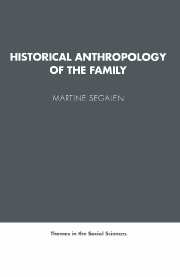Foreword
Published online by Cambridge University Press: 14 January 2010
Summary
There is no truly comprehensive textbook on “the family” currently available. There are many works on the family in pre-industrial cultures, mostly written by social anthropologists. There are books on the past of specific European societies, mainly by historians. There are studies of contemporary western communities, largely by sociologists. But the differences between training and research methods in these disciplines result in publications of very different kinds.
In this book, Martine Segalen manages to cross these disciplinary divides in a highly constructive way. Her continental European background affords a fresh perspective from that of much Anglo-American sociological writinġ, which tends to take as its norms the lower-class family in Bethnal Green, the blacks of Chicago, or the middle class of Yankee City. But at the same time she is well acquainted with the work done in English-speaking areas, concerning both the present and the past. It is one of her great strengths that she not only avoids parochialisation but spans the various academic fields of anthropology, history and sociology. She is thus able to deal with the family both in pre-industrial and ‘Third-World’ societies, and in its urban and rural manifestations in the industrialized world.
Martine Segalen has done research in rural Normandy and Brittany, having worked as well in an urban milieu. Starting with an enquiry into the selection of marriage partners, her work later expanded into a study of the connections between domestic groups, the relations between the sexes and types of inheritance and succession, as well as of related rites and symbols.
- Type
- Chapter
- Information
- Historical Anthropology of the Family , pp. ix - xPublisher: Cambridge University PressPrint publication year: 1986



